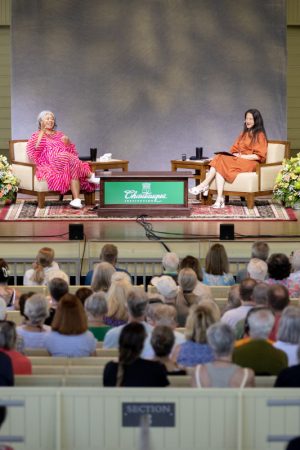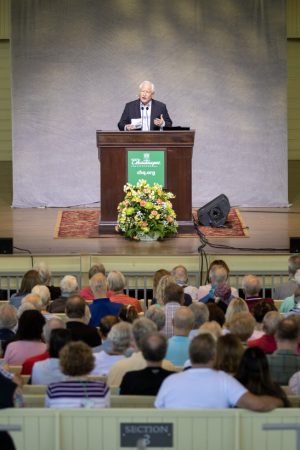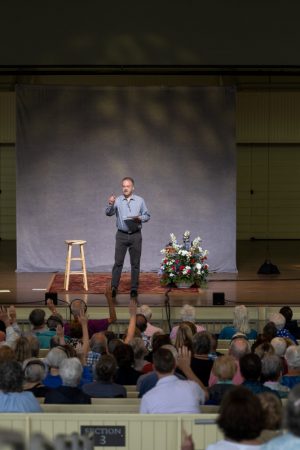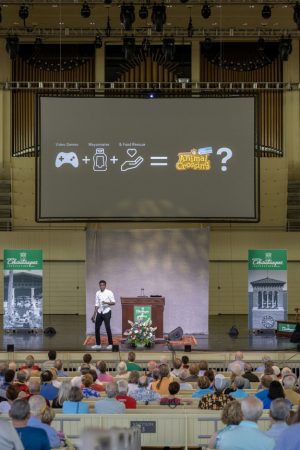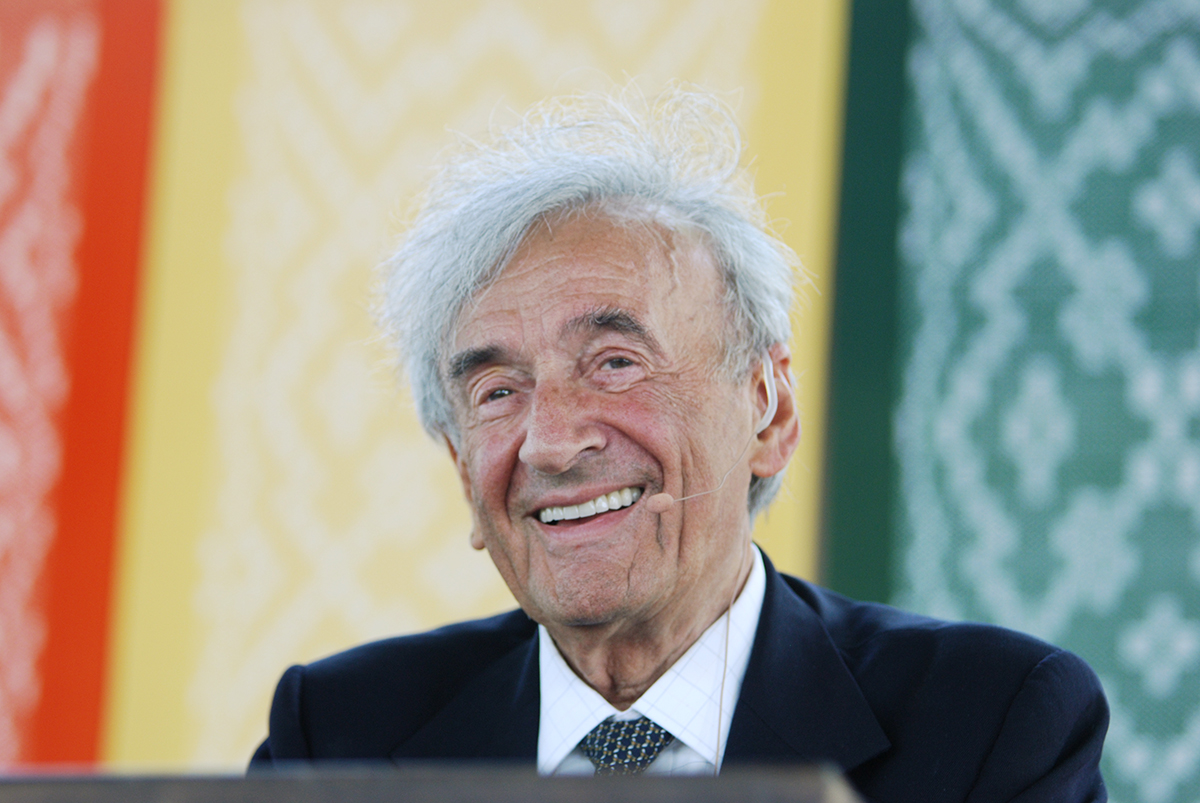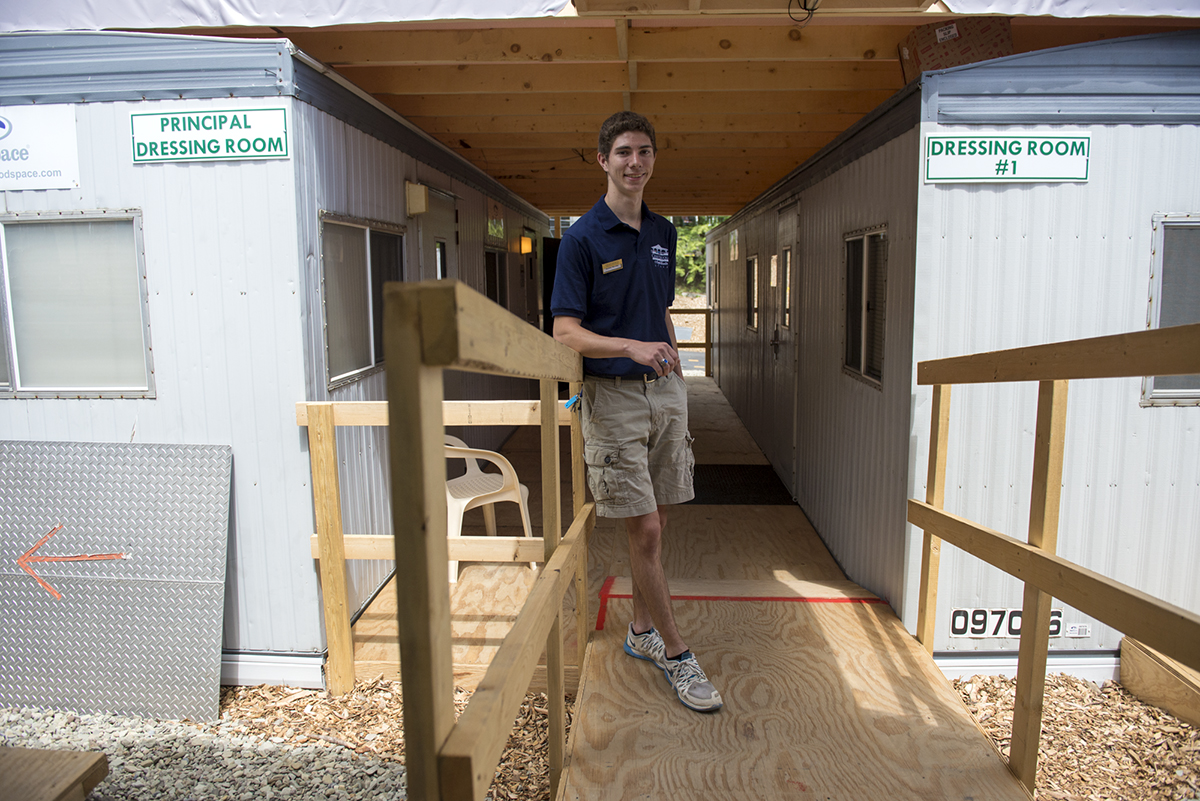

Nick Glunt | Staff Writer
 Theodore Olson, former U.S. solicitor general, answered questions from John Q. Barrett, professor of law at St. John’s University and frequent Chautauqua speaker, on stage Thursday. Olson addressed a variety of topics, including his personal experiences with the Supreme Court, the 9/11 attacks and California’s Proposition 8.
Theodore Olson, former U.S. solicitor general, answered questions from John Q. Barrett, professor of law at St. John’s University and frequent Chautauqua speaker, on stage Thursday. Olson addressed a variety of topics, including his personal experiences with the Supreme Court, the 9/11 attacks and California’s Proposition 8.
Olson was the fourth speaker in Week Two’s topic, “Applied Ethics: Government and the Search for the Common Good.”
“There are a lot of things that one could shoehorn into ‘the common good,’” Barrett said, “but among the things we have in common is our system of law. … It creates our society. And that rule of law is in the hands of each of us, but particularly in the hands of our legal profession.”
Interpreting the Constitution
Barrett brought up the topic of constitutionality being “fixed,” as opposed to the Founding Fathers giving Americans the Constitution as a tool to work in whatever situation is required of it.
“I think that the idea that there’s one way to interpret the Constitution and that solves all your problems is just silly,” Olson said. “I also believe that the Constitution needs to be something that people attempt to interpret the way it was intended to be interpreted and to instill in our society the values that the people that passed that Constitution believed in and what they enacted.”
The problem, Olson said, lies in phrases like “due process,” “reasonable searches and seizures” and “cruel and unusual punishment.” The application of those phrases is the Supreme Court justices’ choice to make, Olson said.
In the situation of reasonable searches, the advancement in technology complicates the definition. With telephones and Internet, invasions of privacy are made more possible and therefore less understood in terms of constitutionality, Olson said.
Judges, he said, must interpret the Constitution in a way that makes sense in the context of today.
Personal experience
Olson outlined his path to practicing law, including his participation in a college debate team, his appointment to the Office of Legal Counsel under Ronald Reagan and being targeted in the Watergate investigation — after which it was discovered he was not involved.
Olson’s experience in law has given him the opportunity to represent causes and people he’s both supported and opposed.
Among his most high-profile cases, Olson represented George W. Bush in 2000’s Bush v. Gore and worked on a lawsuit against Proposition 8, a state Constitutional amendment that banned gay marriage in California.
Though he identifies himself as Republican, Olson said he doesn’t let that party line stand in his way of following the common good. As a lawyer, he said, he always has the choice to turn down cases. That doesn’t always mean he does.
Specifically, Olson is very supportive of gay marriage, despite his Republican Party affiliations. He teared up on stage, commenting on how the topic always gets him emotional.
“When you look into the eyes of the people who are affected (by Proposition 8),” Olson said, “you have to be emotional about it. (NPR’s) Nina Totenberg asked me in an interview, ‘You get emotional when you talk about this, don’t you?’ and I said, ‘What kind of person would I be if I didn’t?’”
In that way, he said, party ideologies are less important than personal beliefs.
Olson’s view of the common good is also affected by his wife’s death. His wife, Barbara Olson, was a passenger on American Airlines Flight 77, the hijacked plane that crashed into the Pentagon on 9/11.
“I felt at the time that it was important for me to appear on various television shows and to talk about Barbara, to talk about terrorism and to talk about process,” he said, “because Barbara was a public figure.”
Because Barbara was an author, Olson said, her face was one of the first to be revealed as a victim of 9/11. He saw himself and his wife as personifying Americans that day. He was able to help people cope because he, too, had faced pain that day.
The common good
Olson said he is very hopeful about the nation’s pursuit of the common good. The U.S. has survived world wars, terrorism, slavery and discrimination, he said. He’s certain it can survive the problems the U.S. is facing now.
“I’m pretty optimistic. I think it’s important to be optimistic,” he said. “I think that, by and large, I have a lot of faith in the people of this country.”
Q: I will start by asking you if there are some issues that you hope will drift your way in terms of arguments that you’d like to make.
A: Well, I like that; I’ve been very blessed because I’ve had challenging legal questions come to me that I get to argue in federal appeals courts or, in many times, in the Supreme Court. It’s a thrill for a lawyer to be in the Supreme Court; it’s a thrill for anyone to have the opportunity to deal with these things, and I don’t have a checklist. I have some cases that I hope the Supreme Court will take, and so we want those to be heard, but if there are difficult legal problems that present constitutional challenges where it’s really going to be a contest in the Supreme Court, I’d love to do it. Now, I love cases involving individual liberties — freedom of speech and freedom of the press and things like that — but I’ll take pretty much anything if it’s really an interesting case, and it doesn’t involve certain things that I wouldn’t want anything to do with. But I argued, for example, I’ve argued on the decision that the President of the United States really doesn’t like the Citizens United; that has to do with whether corporations can express their views with respect to people running for office. I argued that case and won it, but five years before, I argued the opposite side of the case on behalf of the government, and we won and upheld the federal election laws, so I’ve sort of been on both sides of these issues, and it’s really fun to have the chance to be in the arena.
Q: We have some questions about your opinions on recent Supreme Court rulings. I think you just mentioned Citizens United, but what about the Wal-Mart legislation?
A: I have to disclose a bias; my law firm represents Wal-Mart. I was on the brief; I helped my partner win that case, I think, and I’ve debated about it a little bit. I was over in Europe when the decision came down, and several people that were on the biking group with me thought that it was a terrible decision because the class of plaintiffs lost, and the big corporation won. But really it involved, and part of the case was a nine-to-zero decision on the meaning of certain provisions of the federal rules of civil procedure about when class actions can be brought, and when a class is just too big and too unmanageable and doesn’t have enough in common. I think the Supreme Court, again having disclosed my bias, got it absolutely right that this was a class of a million and a half people that included people that alleged to have been discriminated against and people that had not been discriminated against, people that had been promoted, people that were supervisors, people that had made the employment decisions because of the way the company was structured. But the real issue is: How do you handle class actions where individuals are not representing their case, but they’re representing someone else’s case, and they’re representing people that won’t be heard but will be affected, sometimes adversely, by a decision, and how far do we go with that kind of representative litigation? So I think it was the right decision.
Q: There are about three questions that I’ve seen so far about the connection between the 14th Amendment and the current budget crisis and asking for your comments about that.
A: I’m not sure what the questions relate to. I think the things that we’ve been hearing about, with respect to Obamacare, the health care issues, have to do with the commerce clause, and when how far can the government go with respect to imposing requirements that you buy insurance or pay a fine — that’s sort of a commerce clause issue. The budget crisis and the 14th Amendment, I’m not sure I have an opinion about because I’m not sure precisely what the issue is.
Barrett: I think what it’s asking about is a Section 4 argument, this public; I have my pocket Constitution —
Olson: He’s been waiting for the chance to drag that out. I thought you were going to nail me after the questions.Barrett: The only reason he didn’t bring his is because he knew I was carrying it for both of us. But there’s an argument that’s percolating about Section 4 of the 14th Amendment that’s the validity of the public debt shall not be questioned. In other words, that a debt ceiling might be unconstitutional pursuant to that declarative phrase.
Olson: You know, I haven’t studied that. I don’t know the answer to that question. This is maybe the next case. Whoever really cares about that and can afford to…
Q: Justice Jackson was a graduate of Albany Law School, asserts this questioner. Is it healthy that all the present Supreme Court justices went to Yale or Harvard?
A: That’s a really good point. There’s six, I think, Harvard and three Yale. There’s three from Princeton; there are six Catholics, not one Protestant on the Supreme Court, so we have diversity on the Supreme Court in some respects, and we don’t have diversity. There’s mostly people from the East. The ones that came from California, Justice Kennedy and Justice Breyer, actually both went to Harvard, so they all come out of the same system. There’s 36 clerks, four per justice, and virtually all of them went to Ivy League schools, maybe a couple from Chicago, a couple from Stanford, and they all clerked for the same federal circuit court judges before they went to the Supreme Court. And I’ve actually kidded justices on the Supreme Court and said, “Don’t tell me about diversity, you know, if you didn’t go to Harvard or Yale, you’re not on the Supreme Court. You’re all thinking the same,” and then they come back with, “Well, did you read that last five-to-four decision?” I think it’s an interesting question, but I don’t know where we come out on that. I will say, especially because John’s involved in this, that Justice Jackson ought to be an example for every Supreme Court justice.
Q: There are a couple of people in the audience who want to know about your partnership with David Boies and what your current relationship is with him.
A: David Boies is one of the outstanding lawyers in the United States. If you ever watch him cross-examine a witness, you’ll say, “There’s no question about who’s the best lawyer in the world.” He’s fascinating to watch; he’s wonderful to work with. When I was approached about the Proposition 8 case, I decided that it would be unhealthy if it was just about me. So what I wanted to do, and I don’t mean that it was all going to be about me, but I didn’t want our issues to get distracted by the fact that I was a Bush v. Gore guy, so I said, “We need to get a prominent, highly respected lawyer who’s been in the Supreme Court who’s identified with the other part of the political spectrum, and I thought, “What a great idea it would be if I could talk David Boies into this,” and I called him up on the phone, and everybody that was involved in the case said, “That’d be fantastic. Do you think he would do it?” and I said, “Let’s ask him,” and I called him up, and I didn’t even get the question out before he said “yes.” So, what that has allowed us to do is go to the American people and say it’s not a conservative or liberal issue; it’s not Republicans or Democrats; it’s not even gay lawyers representing gay people. It is a matter of constitutional imperative, of human rights, American rights, liberty and freedom, and then people want to put us on camera to ask us questions about what it’s like to work together, and it gives us an opportunity to talk about the issues and the people we represent because we know, we can win this case in court, but if we don’t win it also in the court of public opinion, we won’t have achieved our aims. But if at the end of the day, we win this case in court and the American people said, “Of course, that’s the right outcome,” then we will have succeeded. So, I’ll say one more thing; David Boies is an absolute delight to work with, and we’re co-chairing a task force for the ABA that is trying to publicize the plight of our judicial systems in the United States that are being affected by budget cuts, which means poor people don’t have access to the courts. But we’re also on the opposite side of this football case. We went biking in Croatia two weeks ago. Our wives are great friends and colleagues; he’s a wonderful person to work with, and the teamwork has been spectacular.
—Transcribed by Emma Morehart


